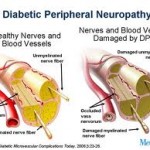 Note: peripheral neuropathy is often referred to as diabetic neuropathy because the disease commonly afflicts those with diabetes, but it can also have many other causes.
Note: peripheral neuropathy is often referred to as diabetic neuropathy because the disease commonly afflicts those with diabetes, but it can also have many other causes.
What are the first symptoms of peripheral neuropathy?
Peripheral neuropathy symptoms often begin with a tingling or prickling sensation in the extremities. Most often the feet are the location of the first symptoms, but in a smaller number of cases it develops in the hands initially. Sometimes the pain is strong and is described more of a burning or stabbing sensation, or even a feeling of “electric shock”. The pain may also be coupled with a physical loss of coordination and muscle weakness. The affected area exhibits decreased tactile sensation and a lessened ability to detect hot and cold stimuli.
The symptoms are almost always symmetrical in nature, in other words, the symptoms manifest themselves in both feet or both hands equally and symmetrically and at the same time. If the pain is felt in only one foot or one hand, this is a telltale sign that the symptoms are a result of neuropathy, but rather a bruise or some other malady.
Why do peripheral neuropathy symptoms usually first manifest in the feet or hands?
The reason peripheral neuropathy symptoms initially express themselves in the hands and feet is because that is the location of the longest nerves from the central nervous system (the brain and spinal cord). Neuropathy, by definition is nerve damage, and results in the disruption of the transmission of electrical signals between the brain and the rest of the body via the peripheral nervous system. The farther those signals have to travel to reach the brain, the greater the chance that there will be “interference” that will inhibit successful transmission of the signals. Because nerve signals from the feet and hands must travel farther than any other body location, there are the first to show signs of neuropathy.
Peripheral neuropathy symptoms should not be ignored
If steps are not taken to remedy the cause of the neuropathy, the disease and its symptoms will eventually spread inward and upward to the arms and legs and can eventually affect virtually the entire body. For this reason, it is imperative that you take the proper steps to diagnose the cause of your symptoms. There are quite a number of things that may cause peripheral neuropathy symptoms, unfortunately, and for this reason it is sometimes difficult or impossible to determine the exact cause. There are however, a few leading culprits to look to first.
Type II diabetes is currently the leading cause of peripheral neuropathy symptoms
Diabetic neuropathy results from nerve damage caused by prolonged exposure to high blood glucose levels. Symptoms of diabetic neuropathy present themselves after several years or even a decade of untreated type II diabetes. Many times the afflicted is not even aware that they had type II diabetes, as the neuropathy symptoms were the first sign. If you are experiencing symptoms of peripheral neuropathy, have your blood checked for excess glucose levels to rule out type II diabetes as the underlying cause.
When a person with diabetes begins to suffer symptoms of diabetic neuropathy, it is important that they seek treatment quickly and regulate their blood sugar to normal levels. Successful treatment of diabetes will inhibit the progression of the disease and in many cases can reverse the symptoms of neuropathy, especially if done early enough before any permanent nerve damage can occur.
What are some other leading causes of peripheral neuropathy symptoms?
- Heavy metal toxicity including lead, arsenic, and mercury. Mercury poisoning is especially common today due to the rising levels of mercury in the oceans due to pollution. People who eat lots of fish or sushi are susceptible to mercury poisoning.
- Vitamin B deficiency. Many hospitals offer vitamin B tablets as one of the front-line treatments for peripheral neuropathy symptoms.
- Alcoholism. Excessive alcohol consumption often results in vitamin deficiency, especially for water-soluble vitamins such as vitamin B. Long-term alcoholism can also contribute to diabetes and cause nerve damage which results in neuropathy.
- Certain prescription medications may cause symptoms of peripheral neuropathy in some people. Discuss any medications that you may be taking with your doctor as they may relate to your symptoms.I
- Infections. Some bacterial or viral infections can cause symptoms of peripheral neuropathy, including limes disease, shingles, and HIV-AIDS.
- Kidney disease and liver disease can also cause neuropathy symptoms
Your doctor can run a blood lab test to check for heavy metal poisoning, vitamin deficiency, and infections. Do not ignore your symptoms, as it is important to investigate and reverse the cause of the neuropathy before your symptoms progress.
Peripheral Neuropathy Treatment
 |  |  |  |
| Penetrex® | Nerve Support Formula Vitamins | Neuropathy Cream | Neuropathy Rubbing Oil |


Leave a Reply